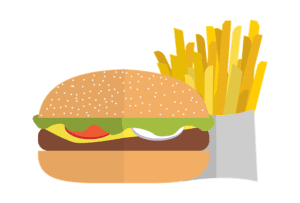Carbohydrates and losing weight are linked, as various enzymes break down carbs into simple sugars and then glucose to be absorbed into the blood. Digestive enzymes are like biological scissors – they chop long starch molecules into simpler ones.

Carbohydrates Can Reduce our Fat-Burning Ability
If we cannot burn all the fat we consume, the remainder is stored as fat tissue. This fat-burning ability is determined by the amount of insulin in our bloodstream. When insulin levels are low, we burn mainly fat. When they are high, we burn mainly carbs. However, a problem arises when insulin levels remain constantly high, as in individuals suffering from insulin insensitivity.
In such cases, the constant need to burn carbohydrates reduces our fat-burning ability, resulting in more fat being stored as fatty (adipose) tissue.
The speed of digestion is determined by the chemical nature of the carbohydrate itself and, thus, how “resistant” it is to the activity of the enzymes. Simple sugar is usually much less resistant than starch and is digested or metabolized much faster. Things that slow down digestion include the presence of acid (from gastric juices or the food itself) and the presence of soluble fiber.
High Insulin Levels May Increase Risk of Obesity
This is why experts are linking high insulin levels, together with a reduced ability to burn fat, with obesity. And as you can see, high insulin levels are typically determined by the type of carbohydrates we eat. High GI foods or meals trigger higher insulin levels than intermediate or low GI foods. This is why the Glycemic Index is considered to be so important when assessing our eating habits.
As we have seen, the human body is fuelled by glucose. Therefore, all foods must be converted into glucose before they can be used as fuel. Carbohydrates are more easily converted into glucose than protein or fat and are considered the body’s “preferred” energy source and the brain’s essential energy source.
Simple carbohydrates (excepting fruit sugar) are more easily converted into glucose because their molecular structure breaks down faster in the stomach and small intestine. Therefore, they rapidly raise glucose levels in the bloodstream (less than 30 minutes). This explains why people with diabetes, who occasionally suffer from an excessively low blood-glucose level, can quickly restore their balance by eating simple carb foods like sweets.
Foods High In Carbohydrates
Regarding maximizing your energy levels, carbohydrates are the best “go-to” food. Think of them as gas in your fuel tank. If you don’t provide yourself with enough throughout the day, you won’t have the energy to function. This would be a shame for new moms who don’t have much energy reserve and have one or more little kids relying on them for just about everything.
Everything we eat is a combination of protein, fat, and carbohydrates. Simple sugars, like table sugar, starches, like pasta, and fiber, like oat bran, are types of dietary carbohydrates.

All carbohydrates deliver four calories per gram. Something to digest: All carbs are not bad! They are vital because they provide the body with the energy it needs to support daily activities like breathing and digestion to thinking and exercise.
Consuming whole grains and high-fiber carbohydrates, including fruits, veggies, dried beans, and whole-grain cereals, bread, and crackers, will make you feel satisfied for more extended periods than foods high in refined sugar and low in fiber (i.e., cakes, cookies, sugary candy, etc.).
Foods high in fiber expand in your digestive tract, making you feel full. To visualize how fiber expands, put a piece of whole-grain or bran cereal in a bowl with a little water, then watch it swell to two to three times its original size.
Carbohydrates cause blood sugar levels to rise quickly, while fat and protein cause blood sugar to rise more slowly. In response to a rise in blood sugar, the body releases insulin, the hormone required to bring blood sugar into cells or fat tissue.
If one eats excessive amounts of carbohydrates, the insulin cycle can become imbalanced, resulting in continually raised insulin levels. High insulin levels are often associated with obesity and increased risk for heart disease and blood sugar imbalances. Controlled carbohydrate diets may promote a gradual rise and fall of insulin and are, therefore, more satiating. In high protein/controlled carbohydrate diets, it is thought that weight loss occurs through the consumption of fewer calories resulting from increased satiety.
Weight loss also occurs because deficient carbohydrate intake triggers a condition called ketosis, which forces the body to burn fat stores. Still, ketosis can be unhealthy if it is continued for long periods.
The Glycemic Index
This measures how quickly a carbohydrate digests, enters the bloodstream, and raises blood sugar levels.
High Glycemic Index Foods
Foods such as refined flour and high-sugar beverages are quickly digested, causing a rapid rise in blood sugar and insulin levels. Such effects have been linked to diabetes, overeating, and obesity.
Low Glycemic Index Foods
Generally, foods high in fiber and protein contribute to a steadier blood sugar level and have been shown to lower cholesterol levels and decrease the risk of diabetes.
Many diets recommend eating low-glycemic foods like beans, dairy products, fruits, and vegetables. Remember that a food’s glycemic index may be balanced in the context of a meal when several foods of varying glycemic levels are consumed.
Remember, many theories exist about what constitutes a “perfect” diet. We believe a good foundation for any diet consists of fresh, minimally processed foods from all food groups.
These include
- lean proteins
- Fresh fruits and vegetables
- grain-based bread
- cereals, and pasta
- heart-healthy fats such as olive oil, nuts, and avocado.
It is just as important as a carbohydrate diet for weight loss to enjoy a proper diet that contains delicious foods, preferably organic, and is one that you can maintain as an ongoing lifestyle choice.

